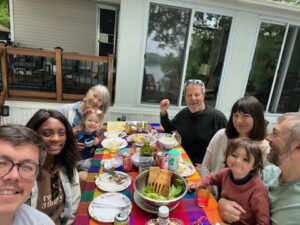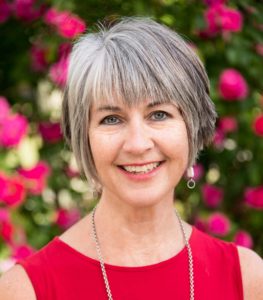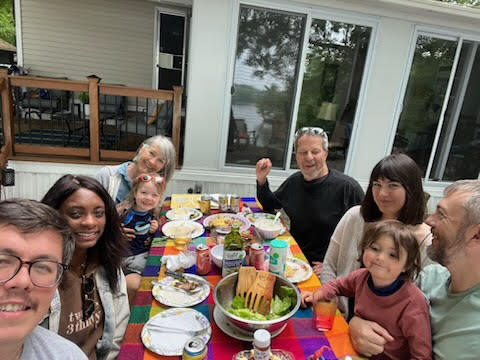January 13th, 2024
“When we are in the position of caring for others, we need a plan for self-care. We cannot give what we do not have. As adults, we will not have what we have not given to ourselves. We are responsible for prioritizing self-care, rather than leaving it until the end of the day if there is any time or energy left.” -Judith Frizlen

Caring Together
Written by Judith Frizlen
I remember as a young mother feeling conflicted about the demands of caring for my children and caring for myself. When I asked my mother if she felt guilty about her mothering, she did not hesitate before saying no, she did not. How times have changed. It took years of trial and error for me to understand that when the rhythms of family life were balanced, I could ensure that both my needs and the needs of the children were met. And to let go of guilt for needing to take time for myself. Although children might want us all the time, they don’t truly need us all the time. Breaks and boundaries are an integral part of the relationship.
But how is that possible? When I was a child, my mother had friends in the neighborhood, and they got together for coffee in the daytime and card games or meetings in the evening. I recall when my finger got closed in the front door and an emergency room visit ensued, one of my mother’s friends came along to support her and another stayed with the children left at home. There were eight of us in all, and we were not the largest family on the block.
It was a time when children of mixed ages played outside together until it was mealtime, someone got hurt, or in the evening, the streetlights came on. There was a natural flow to life. Siblings shared a bath, toys, and friends. My mother could manage to care for her large group and still get her social needs met, including regular visits to the hair salon and church during the the week. Life was set up in a way that made that possible.
But when my daughter was young and I was staying at home finishing my studies to be a teacher after leaving NYC and a career in public relations, life looked different. There were no other stay-at-home moms on the block, I had one child and not a lot of free time. Later when I discovered other stay-at-home moms in the Waldorf school community, I found a way to meet my social needs as well as our children’s needs. Having community made life much easier.
Later when I got certified in the LifeWays model and opened a center to serve children of working parents, I found a way for teachers to get their needs met through the course of the day. When children were playing, adults could take care of domestic activities essential to running a play-based program in a homelike environment. Adults could eat when the children ate, rest when the children rested, get some fresh air and movement when the children went outside and socialize with peers while they were there.
That was a great “aha” for me that felt much like the model for caring for children I experienced in the 1960’s when I was growing up. Then later, I had another experience of finding that my needs and the needs of children in my care could align in a simple and practical way.
That’s when I became a grandmother and took care of my grandsons for when they were babies. I found that my needs for food, rest, outdoor movement and tending my home could all happen within the flow of the day. And at the end of the day, I had photos and stories to share with anyone who was willing to look or listen as I gushed with joy about my membership in the grandparent club. Any work that I set aside to be with the grandchildren, was there waiting for me when they went home.
Of course, in a LifeWays center or a grandparents’ home, we are a second tier of support with built-in breaks from childcare that allow for self-care. That makes it easier for sure. Nonetheless, I think the goal of getting as many needs met as possible during our time with children is a recipe for success. And being present in the moment instead of divided by doing many things at once, conserves energy.
An important tip is to maintain an early bedtime for children – for two reasons. Well-rested children are healthier and happier. And secondly, when children are asleep at 7:30 p.m., adults have an evening on their own to read, rest, converse or whatever they choose. It is worth the effort to build an early bedtime habit. What may be hard short term is easier long term and parenting is a long game.
Instead of living in a society where the flow of life just happens, we are living in times where we must make conscious choices. We can create rhythms of the day and week that consider both children’s and adults’ needs. It might involve going home early from social gatherings but again, it is worth it and the days that seem so long, feel short when we look back at the years.
Rhythms of the day provide a structure that serves both children and adults. When we know what will happen when, it involves less decision-making, more flow and ease in the day. And when we set up the rhythms so we get our work done while the children play, we model constructive movement children can imitate in their play.
And when we sing, dance, or laugh while we work, we model the joy of living. Don’t we all need doses of joy every day?
Without joy, self-care lacks the levity, light, and liveliness of the young child who let’s recall, led us to this conversation. Although there are many elements of modern living I embrace, there are things from the past that I choose to cultivate and celebrate as well. Namely, rhythms, community, and joy; they are foundational to creating a culture of care.
Join us for an Online Workshop for Women with Judith Frizlen
Sunday, January 21, 2024, 12-2:30pm Central

Step into self-care in the new year! This workshop is for you…
…If you find yourself drained at the end of the day and wishing you had more time for yourself.
… If you regularly find that you have neglected your own basic care needs in the midst of busyness.
… if you are suddenly pouring more hours of your day into caring for others and wondering how you might get back something juicy in life just for you.
… If you want to discover what exactly gets in the way of devoting time for yourself, be it literal time constraints or subconscious road blocks.
… If you are seeking a village of support for finding a more sustainable pace and rhythm to life.
Care Begins with Me – An Online Workshop for Women
Learn more about Judith’s upcoming workshop here!
Judith F rizlen is Director of The Rose Garden Early Childhood Center, which she opened in Buffalo, NY after completing the LifeWays Training. The Rose Garden serves is a developing Representative Site of LifeWays North America. Judith is a mother, educator, author of several books, including her most recent, Where Wisdom Meets Wonder: Forty Stories of Grandma Love and community supporter.
rizlen is Director of The Rose Garden Early Childhood Center, which she opened in Buffalo, NY after completing the LifeWays Training. The Rose Garden serves is a developing Representative Site of LifeWays North America. Judith is a mother, educator, author of several books, including her most recent, Where Wisdom Meets Wonder: Forty Stories of Grandma Love and community supporter.
